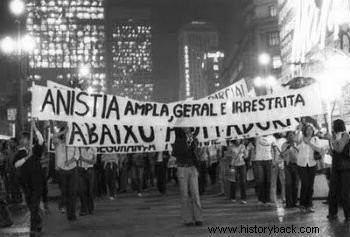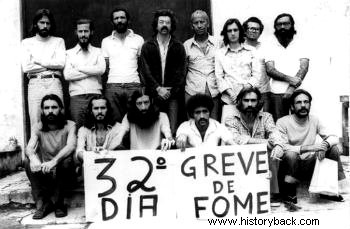Amnesty is the legal act in which political crimes committed within a certain period of time are forgotten.
In Brazil, the 1979 Amnesty Law allowed the return of all those accused of political crimes during the military regime.
Meaning
The word amnesty comes from the Greek “amnesty ” and means oblivion. It is not by chance that it has the same etymological root as amnesia.
Legally, amnesty is the pardon granted by the Legislative Power to crimes that are considered of a political nature. Likewise, the processes that investigated these acts cease to exist. Whoever benefits from actions and amnesty is not liable again for the act committed. It's as if he ceased to exist.
The Amnesty Law was sanctioned by President General João Batista Figueiredo, on August 28, 1979, after intense civil society struggles.
Brazil
The fight for amnesty in Brazil began as soon as the political rights of parliamentarians were forfeited for 10 years in 1964.
However, with AI-5, this claim intensifies because this decree was much more comprehensive. Thus, in 1971, a group of MDB parliamentarians added the request for amnesty in a party document called “Carta do Recife ”.
The government treated allegations of torture and ill-treatment as a smear campaign and tried to silence these voices.
In 1973, however, during the indirect presidential election, opposition candidate Ulysses Guimarães makes a speech demanding amnesty.
Likewise, women joined this struggle with the creation of the Feminine Movement for Amnesty (MFPA) in 1975. This action is important within the framework of Feminism in Brazil.

The Manifesto launched by this organization got 16,000 signatures across the country. Then, civil entities such as the Brazilian Press Association (ABI), the National Confederation of Bishops of Brazil (CNBB), and the Brazilian Bar Association (OAB) openly support the amnesty.
In the same way, the economic model practiced by the military was exhausted and the population began to organize itself around associations such as the Movement against the Cost of Life, among others.
During the Geisel government (1974-1979) there was a timid political opening with the repeal of the AI-5. The death of journalist Vladimir Herzog was a setback for the government, as the Union was held responsible for his passing.
When passing the track to his successor, João Baptista Figueiredo (1918-1999), he continued with the opening policy of Geisel (1907-1996).
However, this should be controlled by the military and its civilian allies, leaving little room for maneuver for the opposition.
More and more, the idea that Amnesty should be “broad, general and unrestricted”, that is, cover all those who practiced acts in the name of the fight against the dictatorship, was gained.
To draw even more media attention, a group of political prisoners incarcerated in Rio de Janeiro begins a hunger strike on July 22nd.
The strikers receive a visit from Senator Petrônio Portela (Arena-AL) who was part of the Mixed Commission that analyzed a bill for amnesty.
 See also:Military Dictatorship in Brazil (1964-1985)
See also:Military Dictatorship in Brazil (1964-1985) Voting
In an eight-hour session at the Congress of Deputies, with exalted speeches and soldiers in plain clothes in the galleries, parliamentarians approve the Amnesty law.
Thus, on August 28, 1979, President Figueiredo sanctioned the law. With this, exiled politicians and intellectuals were able to return to the country and professionals were able to regain their jobs.
The law covered crimes committed between September 2, 1961 and August 15, 1979. It guaranteed the return of exiles to the country; reinstatement of the suspended political rights of employees of the direct and indirect administration; Legislative and Judiciary servants; of foundations linked to public power.
It also extended these benefits to military personnel involved in crimes committed against those who were detained.
In the Amnesty Law, those convicted of terrorism, assault, kidnapping and attempted crimes were not granted amnesty. These processes followed their normal course.
The amnesty immediately benefited 100 political prisoners and 150 banished people. About 2000 Brazilians were able to return to the country and among the people who returned quickly we can mention:Fernando Gabeira, Hebert de Souza, aka Betinho; Leonel Brizola, Luís Carlos Prestes, Márcio Moreira Alves, Miguel Arraes, Francisco Julião.
See also:Songs of the Military DictatorshipAmnesty Commission
The Amnesty Commission was created in 2002 to repair crimes and human rights violations committed in Brazil between 1946 and 1988.
By 2017, the Commission had received 75,000 requests for compensation, whether economic or moral. Of the total, 63 thousand were judged and 40.3 thousand were granted. There are still 10,000 cases awaiting judgment.
It is not always a question of obtaining some economic compensation, but of asking for recognition of the condition of political amnesty and receiving an official apology.
Amnesty International
Amnesty International is an organization founded in 1961 that fights against arbitrary arrests, human trafficking and any kind of violence by the State to its citizens.
In Brazil, in 1972, during the government of General Emílio Médici (1970-1974), the institution released a report denouncing torture in the country.
The international repercussion was so great that Brazilian newspapers were prohibited from mentioning Amnesty International's name in their publications.
Three years later, Amnesty International chooses Brazilian prisoner César Benjamin, a minor student, as "prisoner of conscience" that year.
This meant that he would become the symbol of all those who went through the same situation. In this way, the pressure on the Brazilian government, for his release, increased.
Thanks to the efforts of Amnesty International's lawyers and journalists, César Benjamin was released in 1976 and expelled from the country the following day. He headed to Sweden where Amnesty members had secured him political asylum.
Amnesty International continues to fight for those responsible for crimes committed by military and state agents in Brazil to be punished.
See also:Operation CondorCuriosity
The campaign motto for amnesty was "Broad, General and Unrestricted" and was coined in 1978 by jurist Aloysio Tavares Picanço (1922-2015) when he voted in favor of the opinion drawn up by the OAB for political amnesty. Quickly, the expression won the streets, posters and banners.
Read more:
- Military Coup of 1964
- Constitution of 1967
- Economic Miracle
- Direct Now
